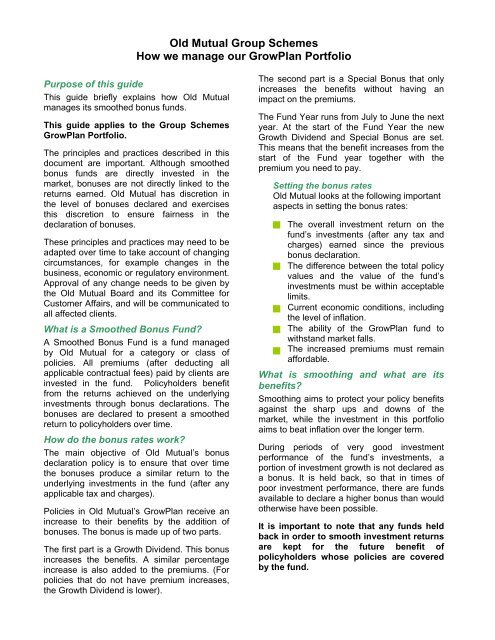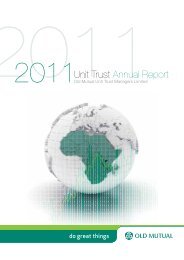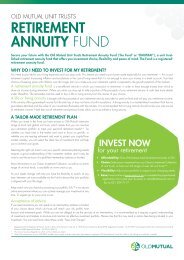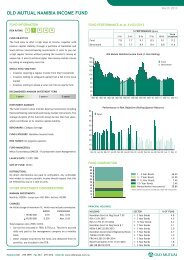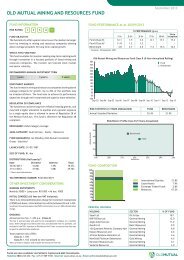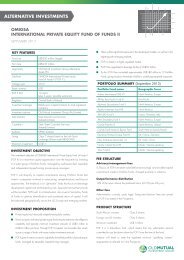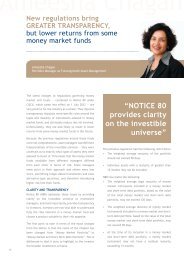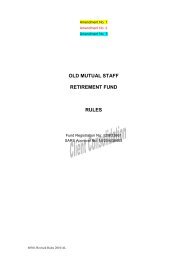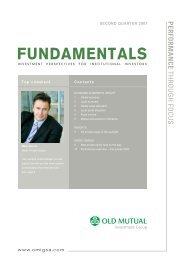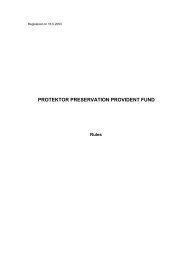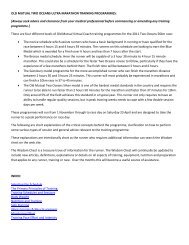Group Schemes GrowPlan Portfolio - Old Mutual
Group Schemes GrowPlan Portfolio - Old Mutual
Group Schemes GrowPlan Portfolio - Old Mutual
Create successful ePaper yourself
Turn your PDF publications into a flip-book with our unique Google optimized e-Paper software.
<strong>Old</strong> <strong>Mutual</strong> <strong>Group</strong> <strong>Schemes</strong><br />
How we manage our <strong>GrowPlan</strong> <strong>Portfolio</strong><br />
Purpose of this guide<br />
This guide briefly explains how <strong>Old</strong> <strong>Mutual</strong><br />
manages its smoothed bonus funds.<br />
This guide applies to the <strong>Group</strong> <strong>Schemes</strong><br />
<strong>GrowPlan</strong> <strong>Portfolio</strong>.<br />
The principles and practices described in this<br />
document are important. Although smoothed<br />
bonus funds are directly invested in the<br />
market, bonuses are not directly linked to the<br />
returns earned. <strong>Old</strong> <strong>Mutual</strong> has discretion in<br />
the level of bonuses declared and exercises<br />
this discretion to ensure fairness in the<br />
declaration of bonuses.<br />
These principles and practices may need to be<br />
adapted over time to take account of changing<br />
circumstances, for example changes in the<br />
business, economic or regulatory environment.<br />
Approval of any change needs to be given by<br />
the <strong>Old</strong> <strong>Mutual</strong> Board and its Committee for<br />
Customer Affairs, and will be communicated to<br />
all affected clients.<br />
What is a Smoothed Bonus Fund?<br />
A Smoothed Bonus Fund is a fund managed<br />
by <strong>Old</strong> <strong>Mutual</strong> for a category or class of<br />
policies. All premiums (after deducting all<br />
applicable contractual fees) paid by clients are<br />
invested in the fund. Policyholders benefit<br />
from the returns achieved on the underlying<br />
investments through bonus declarations. The<br />
bonuses are declared to present a smoothed<br />
return to policyholders over time.<br />
How do the bonus rates work?<br />
The main objective of <strong>Old</strong> <strong>Mutual</strong>’s bonus<br />
declaration policy is to ensure that over time<br />
the bonuses produce a similar return to the<br />
underlying investments in the fund (after any<br />
applicable tax and charges).<br />
Policies in <strong>Old</strong> <strong>Mutual</strong>’s <strong>GrowPlan</strong> receive an<br />
increase to their benefits by the addition of<br />
bonuses. The bonus is made up of two parts.<br />
The first part is a Growth Dividend. This bonus<br />
increases the benefits. A similar percentage<br />
increase is also added to the premiums. (For<br />
policies that do not have premium increases,<br />
the Growth Dividend is lower).<br />
The second part is a Special Bonus that only<br />
increases the benefits without having an<br />
impact on the premiums.<br />
The Fund Year runs from July to June the next<br />
year. At the start of the Fund Year the new<br />
Growth Dividend and Special Bonus are set.<br />
This means that the benefit increases from the<br />
start of the Fund year together with the<br />
premium you need to pay.<br />
Setting the bonus rates<br />
<strong>Old</strong> <strong>Mutual</strong> looks at the following important<br />
aspects in setting the bonus rates:<br />
• The overall investment return on the<br />
fund’s investments (after any tax and<br />
charges) earned since the previous<br />
bonus declaration.<br />
• The difference between the total policy<br />
values and the value of the fund’s<br />
investments must be within acceptable<br />
limits.<br />
• Current economic conditions, including<br />
the level of inflation.<br />
• The ability of the <strong>GrowPlan</strong> fund to<br />
withstand market falls.<br />
• The increased premiums must remain<br />
affordable.<br />
What is smoothing and what are its<br />
benefits?<br />
Smoothing aims to protect your policy benefits<br />
against the sharp ups and downs of the<br />
market, while the investment in this portfolio<br />
aims to beat inflation over the longer term.<br />
During periods of very good investment<br />
performance of the fund’s investments, a<br />
portion of investment growth is not declared as<br />
a bonus. It is held back, so that in times of<br />
poor investment performance, there are funds<br />
available to declare a higher bonus than would<br />
otherwise have been possible.<br />
It is important to note that any funds held<br />
back in order to smooth investment returns<br />
are kept for the future benefit of<br />
policyholders whose policies are covered<br />
by the fund.
What happens if investment returns are<br />
low or if there is a market crash?<br />
Market / fund value adjustments<br />
After periods of poor investment returns, the<br />
amount that policyholders receive when<br />
withdrawing from the fund prior to their<br />
maturity date may need to be adjusted<br />
downward. This “market value adjustment” is<br />
necessary to protect future bonus levels for<br />
policies remaining in the fund until their<br />
maturity date. If this adjustment was not in<br />
place, the values paid to those leaving before<br />
maturity would be too high and could mean<br />
that those that remain receive future bonuses<br />
that would be too low.<br />
A market value adjustment is only applied<br />
when a policyholder wishes to withdraw<br />
money before maturity. If you continue<br />
paying premiums according to your policy<br />
and withdraw from the fund only on<br />
maturity you will not be affected by a<br />
market value adjustment.<br />
Actions <strong>Old</strong> <strong>Mutual</strong> can take<br />
If investment conditions are extremely bad, <strong>Old</strong><br />
<strong>Mutual</strong> may need to take some action to make<br />
sure that future bonuses can be maintained.<br />
These actions need to be approved by the <strong>Old</strong><br />
<strong>Mutual</strong> Board.<br />
Where can you find out more?<br />
If you are an existing client, your policy<br />
documentation and / or original quote should<br />
contain additional detail about your specific<br />
fund. Although every effort has been made to<br />
present information consistent with your<br />
contract, the terms and conditions in your<br />
contract will apply where these differ from this<br />
guide.<br />
<strong>Old</strong> <strong>Mutual</strong> has also prepared a more detailed<br />
official document on its Principles and<br />
Practices of Financial Management (PPFM).<br />
This guide is based on the PPFM and although<br />
every effort has been made to present<br />
information consistent with the PPFM, the<br />
official PPFM will apply where these differ from<br />
this guide. The PPFM is available on the <strong>Old</strong><br />
<strong>Mutual</strong> website or in hard copy on request.<br />
You can also find out more from your <strong>Old</strong><br />
<strong>Mutual</strong> adviser or broker, or by calling <strong>Old</strong><br />
<strong>Mutual</strong> client services on 0860 60 7000 or by<br />
visiting the <strong>Old</strong> <strong>Mutual</strong> website<br />
(www.oldmutual.co.za).<br />
<strong>Old</strong> <strong>Mutual</strong> can take any (or all) of the following<br />
actions:<br />
• Market value adjustments may be applied<br />
• Special Bonuses may be reduced or<br />
removed<br />
• Low or zero bonuses may be declared<br />
Guarantees provided by <strong>Old</strong> <strong>Mutual</strong> will at<br />
all times be honoured.<br />
What is the portfolio invested in?<br />
The investments underlying the fund are made<br />
up of a balanced mix of local and international<br />
investments, such as shares and bonds.


